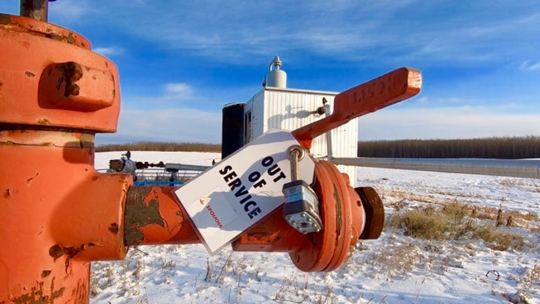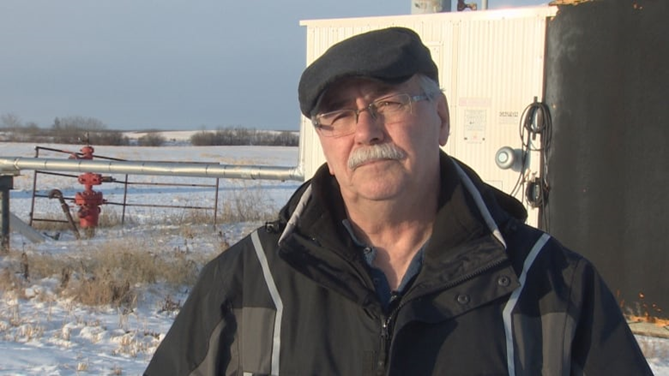There are calls for consolidation as some companies fail to pay their taxes
Kyle Bakx · CBC News · Posted: Jan 30, 2020 4:00 AM ET | Last Updated: January 30

There is no denying how much the oilpatch has provided Alberta over all these years — the jobs, tax revenue, government royalties and economic activity — a benefit to nearly every corner of the province, no matter how remote.
It’s oil and gas funding community centres and arenas. It’s oil and gas revenues helping pave rural roads. It’s oil and gas building the tallest office towers in Western Canada.
At least, until recently.
The prolonged downturn in prices has taken the shine off the industry and affection for the sector is also taking a hit.
Last week, rural towns and municipalities announced they are owed $173 million by oil and gas companies in unpaid taxes.
There’s also the revelation the Alberta Energy Regulator is purposely collecting a lower amount from some companies to prevent more of them from going bankrupt. The security deposits are supposed to help cover the cost of cleaning up old oil and gas wells, if those companies fail and no one buys the assets.
On both fronts, some argue, Albertans are giving industry a subsidy.
Raising taxes, slashing services
With the outstanding tax balance, many rural towns and counties are faced with raising taxes on other businesses and homeowners and slashing services. The regulator’s shortfall in security deposit increases the likelihood more government money will be needed in the future to clean up wells.
The situation has some people wondering whether it’s time for a reckoning for Alberta’s delinquent oilpatch companies.
Make no mistake, the majority of companies are paying their bills and are spending money every year to properly reclaim their oil wells.

Still, there are black sheep — mainly smaller oil and gas companies.
They are behind on their bills and teetering on the edge of going belly up.
With so much uncertainty surrounding future oil or natural gas prices, maybe some of these smaller companies won’t last, regardless of whether they are subsidized or not.
Opinions are pretty split. On a provincial CBC Radio call-in show on the oilpatch tax issue, half of the people demanded companies pay up, while the other half said the industry deserved a break.
Time to purge
The tax shortfall is throwing municipal budgets into a tailspin.
The Municipal District of Taber in Southern Alberta is owed more than $2 million from oil and gas companies, which represents close to 10 per cent of its budget.
As a result, the municipality has laid off workers, halted the replacement of equipment, and scrapped plans for road improvements and a recreation centre. There’s no money for anything new.
Of the 44 oil and gas producers operating in the municipality, 15 did not pay their taxes.
“Some of them are actually bankrupt and out of business, but some are just choosing not to pay because there is nothing to force them to pay,” said Reeve Merrill Harris on CBC Radio’s The Calgary Eyeopener.
“If you’re a viable, active company, taxes shouldn’t be an option. They should be something that has to be paid.”
Other municipalities are also raising taxes.
- Alberta landowners urge farmers to cut power to wells with unpaid debts
- Tax revenue shortfall forces Woodlands County to scrap all non-essential spending
That’s got rural landowners complaining about a “triple whammy” of grief with the oilpatch.
Many farmers aren’t getting the full payment from energy companies to use their land, taxes are going up as municipalities aren’t getting paid, and, if they have a geriatric well on their property, they don’t know when it will get cleaned up.
That’s why there is talk in some rural communities of getting rid of the deadbeats.
Landowner Dwight Popowich doesn’t buy the argument that oilpatch companies need a break.
“In my mind, it’s time to consolidate the industry, get the weak players out of the system, get the resource back in the hands of financially stable companies. That’s our problem,” said Popowich, who owns land near the town of Two Hills.

If a small company can’t afford to pay bills, nor afford its eventual cleanup costs, maybe it shouldn’t still be operating, critics say.
The industry is receiving other assistance too. The provincial government introduced a 35 per cent municipal tax break for shallow natural gas producers. The province also lowered the corporate tax rate.
The financial hand-holding of the industry needs to end, according to former Alberta Liberal leader David Swann.
“What other industry, what other corporation is getting this kind of treatment?” he said. “We are just propping them up year after year and ignoring the fact that they are an industry on the way out.”
A reckoning on tax burden
For the oilpatch, the tax issue isn’t anything new. The problem surfaced more than a decade ago and companies have argued for years that their municipal tax bills are escalating too quickly.
Canadian Natural Resources, the largest oil and gas producer in the country, previously said its property taxes swelled five times more than its revenues from 2004 to 2014.
CNRL, of course, still has healthy profits. In the latest quarter, it posted earnings of $1.23 billion, compared with $1.35 billion a year earlier.
It’s the smaller companies that are at higher risk of going belly up.
These companies have employees, investors and suppliers, and are often spending money in parts of the province with limited economic activity.
During the downturn of the last five years, the oilpatch’s pain has been felt across many other sectors, such as rural hotels, for instance.
Before demanding these companies pay their taxes and full deposits to the regulator, some argue the financial fallout should be considered.

The whole sector is already under enough stress and there’s no need to add more pressure, according to Brad Herald, with the Canadian Association of Petroleum Producers.
Forcing companies into bankruptcy would have repercussions.
“That’s challenging for the workers and communities involved where they operate,” he said.
There’s no need to add more financial pressure on the oilpatch, according to Brad Herald, with the Canadian Association of Petroleum Producers. (Kyle Bakx/CBC)
The industry points out that the value of oilpatch assets has declined over the last five years, but taxes haven’t.
“There has to be a meeting of the minds,” said business commentator Deb Yedlin on The Calgary Eyeopener. “The formula that exists today is not reflective of the reality.”
Although the issue may not be new, it seems to be getting worse.
Some in the oilpatch say municipalities should reconsider how much companies are charged in taxes. Others argue a reckoning has already happened in the oilpatch as the downturn has claimed dozens of companies.
What happened in Texas?
A historical case study from Texas shines some light on what could happen when oil and gas companies are forced to pay up.
In 2001, the state’s regulator decided to increase the amount industry owed as security toward eventual cleanup of oil and gas wells.
Small companies were upset, arguing it would drive them out of business.
They were right, although it wasn’t necessarily a bad thing.
University of California San Diego economics professor Judson Boomhower crunched the data and concluded small companies were largely bought up by larger companies.
Oil and gas production remained steady and the sector’s environmental performance improved with fewer of the smaller players.
His findings were released last year in the American Economic Review.
A similar outcome could happen in Alberta, said Boomhower. One big difference, though, is the province’s large number of inactive oil and gas wells. If smaller firms go belly up, some of those wells may become orphans.
“There is a huge population of idle wells [in Alberta], so I do think that is a risk you have to take seriously,” he said.

The risk of more orphans begs the question whether the wells were likely to become orphans in the next few years anyway, or whether some of the wells would likely have been properly reclaimed by operators.
Alberta has an industry-funded association that handles orphan wells, the Orphan Well Association, which is already underfunded and has a backlog of sites. Still, government money already has been spent to help with the growing backlog of wells, pipelines and facilities needing cleanup.
That’s why the Texas case study provides some useful insight, but the impact of a reckoning for unpaid bills isn’t clear, for the environment or rural Alberta.